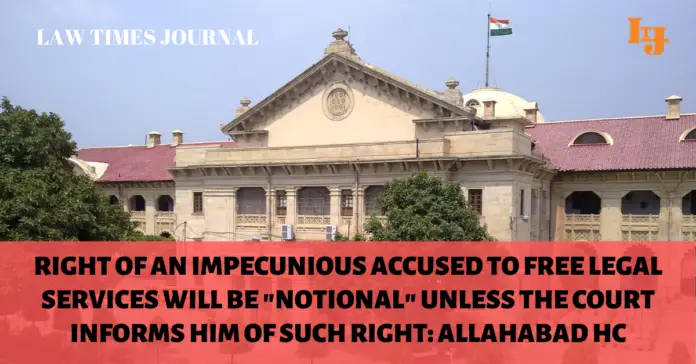
Case: Criminal Revision no. – 1393 OF 2019
Revisionist: Shadaan Ansari
Opposite Party: State of UP & 2 ors.
The Supreme Court in Mathai M. Paikeday vs. C.K. Antony has discussed the concept of ‘indigent person’ as defined under Order 33 of the Code of Civil Procedure, 1908. While discussing the relevant judgments on the topic, the court held as under-
Explanation I: A person is an indigent person,–
1. if he’s not possessed of sufficient means (other than property exempt from attachment in execution of a decree and therefore the subject-matter of the suit) to enable him to pay the fee prescribed by law for the plaint in such suit, or
2. where no such fee is prescribed, if he’s not entitled to property worth one thousand rupees aside from the property exempt from attachment in execution of a decree, and the subject-matter of the suit.
Explanation II: Any property which is acquired by an individual after the presentation of his application for permission to sue as an indigent person, and before the choice of the appliance, shall be taken under consideration in considering the question whether or not an applicant is an indigent person.
Explanation III: Where the plaintiff sues during a representative capacity, the question whether he’s an indigent person shall be determined about the means possessed by him in such capacity.”
In A.A. Haja Muniuddin vs. Indian Railways, this Court has observed: justice can’t be denied to a private merely because he doesn’t have the means to pay the prescribed fee.”
To sum up, the indigent person, in terms of explanation I to Rule 1 of Order 33 of the Code of Civil Procedure, is one who is either not possessed of sufficient means to pay court fee when such fee is prescribed by law or isn’t entitled to property worth one thousand rupees when such court fee isn’t prescribed.
In both the cases, the property exempted from the attachment in execution of a decree and therefore the subject-matter of the suit shall not be taken under consideration to calculate financial worth or the ability of such indigent person. Moreover, the factors like person’s employment status and total income including retirement benefits within the sort of pension, ownership of realizable unencumbered assets, and person’s total in debts and financial assistance received from the loved one or close friends are often taken under consideration to work out whether an individual is possessed of sufficient means or indigent to pay requisite court fee.
Therefore, the expression “sufficient means” so as 33 Rule 1 of the Code of Civil Procedure contemplates the power or capacity of an individual within the ordinary course to raise money by available lawful means to pay the court fee.
Right of an impecunious accused to free legal services will be “Notional” unless the court informs him of such right: Allahabad HC
Section 303 and 304 of the Code of Criminal Procedure read with Rule 37 of General Rules (Criminal), 1977 framed by Allahabad High Court provides for providing legal aid to defend the accused, which must be real and effective aid to an accused and the trial court has to ensure proper compliance of the requirement to fair trial.
Now, it is a fundamental right under Article 22(1) of the Constitution of India that the accused has a right to be defended by the competent practitioner. Hon’ble Apex Court in the case of Mohd. Hussain & Julfikar Ali has held that the trial court has to ensure proper compliance of the requirement to a fair trial as the accused as a right of being provided with the real and effective legal aid.
Admittedly, in the present case, the legal aid provided by the Amicus Curiae was not real and effective, as he denied to cross-examine the prosecution witnesses, therefore, the impugned order has been passed on the wrong premise and is liable to be set aside. The trial court is directed to recall all the prosecution witnesses, whose examination-in-chief was conducted and provide an opportunity to the revisionist to cross-examine them.
Order of the court:
1. Learned counsel for the revisionist submitted that after investigation, charge sheet was filed by the Investigating Officer, on which cognizance was taken by the court below and thereafter the case was registered as S.S.T. No. 78 of 2018.
2. After framing of charges, the prosecution was allowed to produce the witnesses before the trial court. Learned counsel for the revisionist further submitted that since the revisionist was not in a position to engage lawyer, as a result, Amicus Curiae, for defending the revisionist, was provided by the trial court at the State expenses.
3. Examination-in-chief of the witnesses of P.W. 1 to P.W. 9 was conducted before the trial court, but since the opportunity to cross-examine them was not availed by the Amicus Curiae, as a result, it was closed by the trial court. He has further submitted that though in another case, Amicus Curiae cross-examined the witnesses, the same was not real and effective.
4. In such circumstances, an application under Section 311 CrPC. was moved by the revisionist for recall of the witnesses to cross-examine them, but the same was rejected by the court below vide impugned order dated 21st September 2019 with the observation that the Amicus Curiae denied the cross-examination of the prosecution witnesses on the advice of the revisionist.
The revision is, accordingly, allowed. The impugned order dated 21.09.2019 passed by Additional Sessions Judge/Special Judge (POCSO Act), Faizabad in Special Session Trial No. 78 of 2018 is hereby quashed.
Edited by Vartika Gajendra Singh
Approved & Published – Sakshi Raje
Reference:
1. http://elegalix.allahabadhighcourt.in/elegalix/StartWebSearch.do
2. http://www.legalblog.in/2011/07/indigent-person-under-code-of-civil.html
3. https://indiankanoon.org/doc/152235328/
4. Mathai M Paikeday vs. C.K.Anthony on 11 July 2011
5. A.A. Haja Muniuddin v. Indian Railways, (1992) 4 SCC 736








